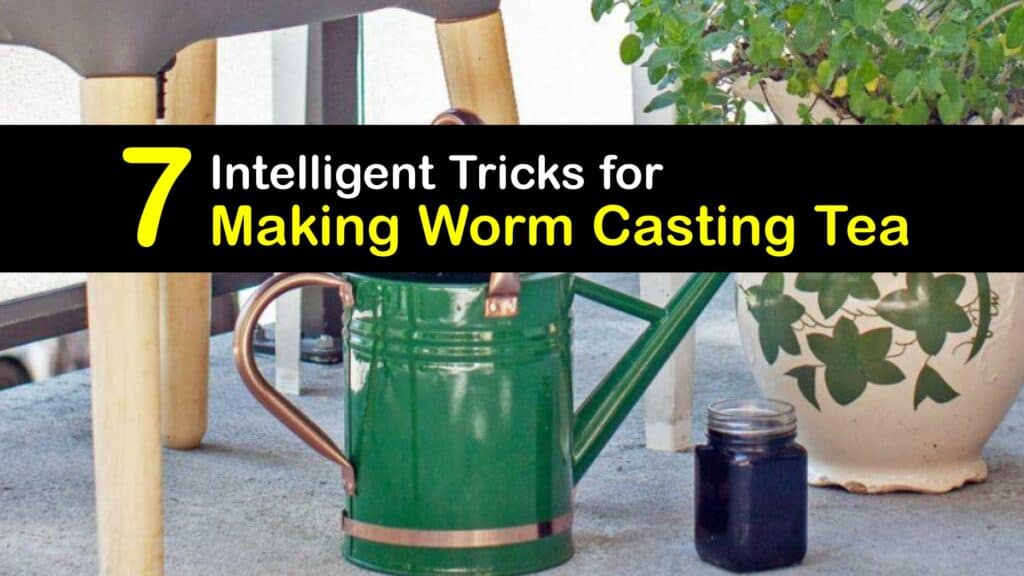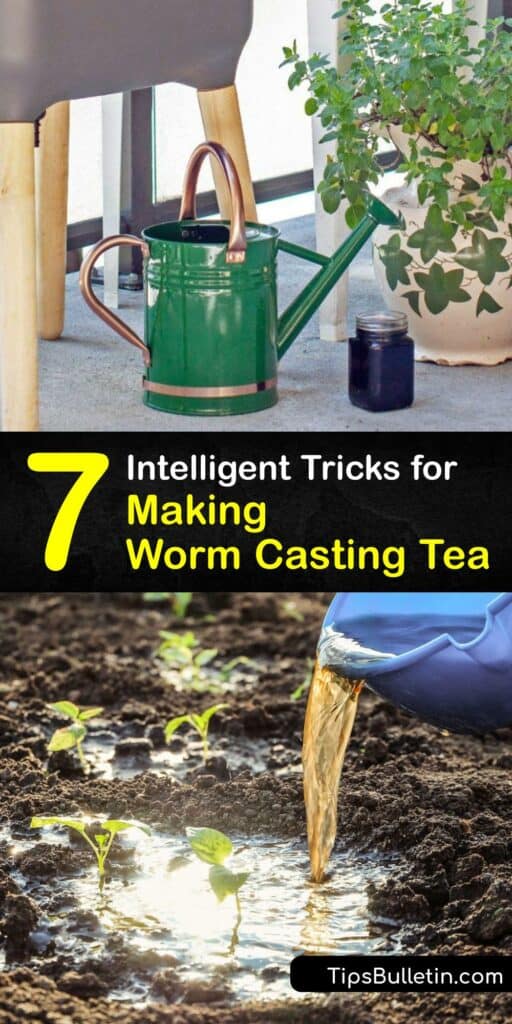Have you ever wondered how to make worm casting tea? It starts with a worm farm or vermicomposting. Vermicomposting employs worms to produce nutrient-rich compost by upcycling kitchen scraps and other waste. A worm farm or worm bin is similar to an outdoor compost pile, though it requires less space and is often used indoors. It is simple – most of the labor is done by the worms – and worthwhile for your plants.
Worm castings, also known as the compost from the worms eating the food scraps you give them, are what the worms excrete as they consume the food. It is worm poop but packed with nutrients for your plants. When you soak some of your worm castings in water like tea leaves, you have worm tea fertilizer.
The end product is an excellent natural and organic liquid fertilizer diluted and used to water house and garden plants. Check out our recipes and explore how make compost tea and how to to use worm casting tea in your home garden.

Make DIY Worm Tea Fertilizer for Your Home Garden
Whether you have an existing vermicomposting system or are preparing to start a worm farm, pot worms are beneficial to a compost bin. Earthworm tea is a cost-efficient way to fertilize indoor and outdoor plants without chemical fertilizers.
The tea is natural and organic and loaded with beneficial microbes which work in the soil long after fertilizing to improve its structure and make nutrients available for your plants. Worm compost tea is a fantastic solution to cultivate larger and more flavorful veggies or bigger and more impressive flowers, or you have a plant needing some nourishment.
Read on to discover the differences between worm compost vs regular compost to find out which one will work best in your garden.

What Is a Worm Farm?
A worm farm is a small-scale alternative to a conventional compost pile, with the added benefit of making compost faster. Earthworms break down organic matter to make finished compost, and their castings may also be used to create a nutritious liquid fertilizer.
A worm bin works faster than a compost heap or pile, thanks to the extraordinary processing power of the worms. A pound of mature types of composting worms composts about half a pound of organic material daily.
It’s simple to start your own DIY worm farm using a large plastic bin, or many commercial options like Uncle Jims Worm Farm are available for purchase.
Add potato peels and rice to the bin. It’s also a good way to compost leaves very quickly – breaking them into small pieces helps. Banana peels are another great option. It’s easy to make banana peel compost tea without adding them to the compost bin, as well.
What Are Worm Castings?
Earthworm castings are a by-product of the worms processing organic materials in a worm farm. When you use worms for compost, they break down kitchen scraps and other matter, castings are produced. Worm castings are worm poo or the excrement formed as a result of the digestion of their food.
Though it sounds disgusting, this worm poop has lots of nutritional value and is easily turned into worm compost tea to become a real asset in the garden. There are other yucky critters that may find their way into your compost. Grubs and maggots are ok in compost in small numbers. Keep an eye on them to ensure they don’t get out of hand.
Learning How to Make Worm Casting Tea
Having a worm farm provides its own set of uses by creating an opportunity to reduce food waste and go greener by relying less on curbside recycling and repurposing nonrecyclables like shredded paper. Making tea from your worm castings is more than just a way to provide critical nutrients and beneficial microbes to your plants.
Chemical fertilizer introduces toxic compounds to your garden and food and negatively impacts pollinators and wildlife. Harsh chemicals threaten your children and pets and may run off and hurt aquatic life. Worm tea is a safer liquid fertilizer for your home garden – preparing it yourself reduces the expense of purchasing commercial fertilizers.
Simple Worm Compost Tea Solution
Make a quick and straightforward worm tea fertilizer using water and the worm poop from your worm bin. Grab four or five cups of earthworm castings from your farm and drop them into a five-gallon bucket.
Fill the bucket with cool, clean water or warm water for a more intense brew. Leave the tea to soak overnight. The watery brown-colored liquid is ready for dilution and application the next morning. Take care not to scoop out any of your worms and check the castings in the bucket for worms before moving to the next step.
Never use worm compost tea with a foul odor or unpleasant smell. If you make a batch that doesn’t smell right, discard it and start over. Do not apply it to your plants. A putrid stench typically indicates unwanted anaerobic microbes in the mixture, and to maintain healthy soil, they are best not added to the garden.
Use fresh worm tea to make your own fertilizer for lettuce and kale, tomatoes, roses, and more. The applications are almost endless in a home garden.
Worm Casting Tea Recipe
Some gardeners prefer to make their worm castings tea following a slightly more complicated worm casting tea recipe to make a richer solution. A sugar derivative provides sustenance for beneficial microbes, and aeration lets them multiply faster in the tea to increase the population available in the finished product.
Add the worm castings to your bucket and two tablespoons of sugar, corn syrup, or sulfur-free molasses, and fill with water. Submerge the tank bubbler in the bucket to aerate the mixture, and leave it to brew for 48-72 hours. This aerated solution provides a higher density of beneficial bacteria than non-aerated brew.
Using Earthworm Casting Tea
Earthworm castings tea is too strong to be applied directly to your plants; dilute it first. Mix one part tea with three parts cool water and add to a sprayer, spray bottle, or watering can and use in place of regular watering.
Worm tea is suitable for vegetable plants and is particularly appreciated by heavy feeders or any veggie needing a nutrient boost. Flowers, fruits, herbs, and more all profit from fertilization. Since earthworm tea is odorless when correctly prepared, it’s ideal to use on container plants or potted plants in your home.
Benefits of Vermicompost Tea in the Garden
Using diluted vermicompost tea in the home garden promotes healthy soil by introducing beneficial microorganisms. These good bacteria enrich the potting soil around your plant roots and break down molecules in the ground to create more plant food. Worm compost tea aids soil water retention to keep your plants hydrated.
Added nutrients support plant growth and keep plants healthy and resistant to insect pests and diseases, and the tea lowers the soil pH. The good bacteria release nitrogen into the soil and provide carbon dioxide as they die, which plants use to photosynthesize. Worm tea is excellent for many types of gardens, houseplants, and lawns.
Worm tea is a versatile liquid fertilizer and requires little labor or preparation to make at home, especially if you have an existing worm farm. Always be sure to dilute your tea appropriately and use it immediately to give your plants the full benefits.
If you need more worm tea help, check out our other articles on adding beneficial micro organisms to your garden or potted plant using vermisterra earthworm casting tea.

If you loved this article on how to make worm casting tea, please share these brilliant ideas about worm tea fertilizer with your friends and family on Pinterest and Facebook.